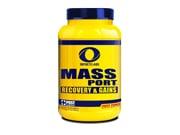

MASSPORT
Table of Contents
ABOUT:
Massport™ is an ideal post workout recovery supplement for protein synthesis, muscle growth, recuperation and rehydration to support muscle fullness after your workout.
MASSPORT™ MAY HELP TO:
- Support Muscle Mass and Strength*
- Support Plasma Volume, Vascularity & Fullness*
- Support Blood Glucose Recovery & Glycogen Replenishment*
- Support Protein Synthesis*
MASSPORT™
Post Workout Recovery*
MASSPORT™ MAY HELP TO:
Support Muscle Mass and Strength*
Support Plasma Volume, Vascularity & Fullness*
Support Blood Glucose Recovery & Glycogen Replenishment*
Support Protein Synthesis*
 Post-workout supplementation has been suggested to be one of the most important variables to supporting your gains in muscle development and recuperation. It has been well established that post-exercise muscle recovery, repair and growth ultimately determine the benefits of exercise to the development of lean body mass. Muscle recuperation is reliant on glucose, amino acids and energy availability for optimal rates of muscle glycogen and protein synthesis. Massport™ is an ideal post workout recovery supplement for protein synthesis, muscle growth, recuperation and rehydration to support muscle fullness after your workout. Massport™ contains five key recovery complexes specifically formulated for those individuals working to acquire bigger gains from their workout regimen. To be consumed intra- or post-workout, Massport™ contains a precise blend of carbohydrates and creatine, betaine, glycerol, BCAAs and glutamine to kick start the growth and recovery process immediately upon consumption.*
Post-workout supplementation has been suggested to be one of the most important variables to supporting your gains in muscle development and recuperation. It has been well established that post-exercise muscle recovery, repair and growth ultimately determine the benefits of exercise to the development of lean body mass. Muscle recuperation is reliant on glucose, amino acids and energy availability for optimal rates of muscle glycogen and protein synthesis. Massport™ is an ideal post workout recovery supplement for protein synthesis, muscle growth, recuperation and rehydration to support muscle fullness after your workout. Massport™ contains five key recovery complexes specifically formulated for those individuals working to acquire bigger gains from their workout regimen. To be consumed intra- or post-workout, Massport™ contains a precise blend of carbohydrates and creatine, betaine, glycerol, BCAAs and glutamine to kick start the growth and recovery process immediately upon consumption.*
Massport contains two sources of carbohydrates (i.e. maltodextrin and waxy maize) as well as ingredients to support the insulin response and depleted glycogen levels. Waxy maize starch has been shown to provide a slow, sustained delivery of energy to the body, whereas maltodextrin provides a fast-acting response. Waxy maize is known to give its user a quick recovery without raising blood-sugar levels. Glycogen recuperation is essential for muscle recovery and athletic performance the next day. Back in 1992, researchers compared the effects of carbohydrate-protein and protein-only supplements on muscle glycogen storage during recovery from prolonged, exhaustive exercise. The researchers found that post-exercise muscle glycogen storage was supported with the carbohydrate-protein supplement as a result of the interaction of carbohydrates and protein on insulin secretion. Another study compared the results of carbohydrate-BCAA to carbohydrate-only supplementation on subjects during exercise. When carbohydrate-BCAA was supplied, the plasma and muscle concentrations of BCAA increased during exercise by 120% compared to 35% for carbohydrate-only.*
For this reason, Massport contains a combination of carbohydrates and BCAAs for muscle recuperation and recovery.*
Massport also contains taurine, betaine, mannitol and glycerol. These ingredients have been known to support cellular water into muscles, which give the muscles a fuller look.*
INGREDIENT BREAKDOWN
Betaine- Betaine is an anti-oxidant that has been found to support creatine synthesis and protein synthesis via intracellular hyper-hydration.*
Glycerol- Glycerol has been added to this formula to support hydration status, nutrient delivery and potentiate the muscle pump associated with resistance exercise. Ingested glycerol assists blood osmolality and draws water into all tissues of the body. Athletes have been experimenting with glycerol ingestion for years, and several studies have been published on the potential benefits of glycerol on endurance performance. A recent meta-analysis concluded that glycerol ingestion increased fluid retention better than water (which is rapidly filtered and cleared by the kidneys) and improved endurance performance by an average of 2.62%.*
Branched Chain Amino Acids (BCAAs)- The branched-chain amino acids (BCAAs) consist of the essential amino acids leucine, isoleucine and valine. BCAAs account for approximately 35% of the essential amino acids in muscle. BCAAs are unique because they are metabolized in skeletal muscle. Numerous studies have demonstrated the anti-catabolic effects of BCAA administration, i.e., a reduction in muscle protein breakdown during clinical conditions of wasting (e.g., starvation, post-surgery, burns, liver disease, etc.). BCAAs act as signaling molecules to support muscle protein synthesis as well as insulin release from the pancreas. Of the three BCAAs, leucine is by far the most important amino acid in this regard. BCAAs have been added to Massport to support the reduction of post-exercise fatigue, muscle protein breakdown and assist muscle protein synthesis.*
Glutamine- Glutamine is the most abundant amino acid in the bloodstream, making up 30-35% of the amino acid nitrogen in the blood. Skeletal muscle is the major tissue involved in glutamine synthesis and is known to release glutamine into circulation. Glutamine plays a crucial role in cellular hydration and leucine uptake, as well as glycogen replenishment. One study reported that ingestion of glutamine alone appeared to support muscle glycogen resynthesis during recovery from exhaustive exercise. However, the addition of glutamine to the glucose polymer drink resulted in a greater storage of carbohydrates. The combination of carbohydrates and glutamine has been added to Massport to assist glycogen replenishment post-workout.*
Creatine- Creatine has been shown to effectively support strength and performance. Adults and teenagers who regularly consume these foods typically eat 1-2 grams of creatine per day, an amount that is roughly equal to the body’s rate of creatine degradation. In an average, healthy adult male, 95% of creatine stores are found in skeletal muscle. Since 1992, over 300 research papers have been published on the effects of creatine as a muscle builder and performance supporter. In general, the majority (~ 65-70%) of these clinical trials have found benefits of creatine monohydrate supplementation, particularly during short, repeated bursts of high-intensity training. Although responses vary from person to person, subjects ingesting creatine average a 2-5 pound greater gain in muscle mass, and 5-15% greater increases in muscle strength and power compared to control (or placebo) subjects. The physiological functions of creatine support energy production during intense, repeated muscular activity. Collectively, these effects allow athletes to perform at higher levels during training, ultimately leading to supported muscle mass, strength, power and high-intensity muscular endurance. Creatine has been added to this formula to support lean mass, as well as muscular strength and power.*
References
Robinson M.J., Burd N.A., Breen L., Rerecich T., Yang Y., Hector A.J., Baker S.K., Phillips S.M. Dose-dependent responses of myofibrillar protein synthesis with beef ingestion are enhanced with resistance exercise in middle-aged men. Appl. Physiol. Nutr. Metab. 2013;38:120–125.
Symons T.B., Schutzler S.E., Cocke T.L., Chinkes D.L., Wolfe R.R., Paddon-Jones D. Aging does not impair the anabolic response to a protein-rich meal. Am. J. Clin. Nutr. 2007;86:451–456.
Pennings B., Groen B.B., van Dijk J.W., de Lange A., Kiskini A., Kuklinski M., Senden J.M., van Loon L.J. Minced beef is more rapidly digested and absorbed than beef steak, resulting in greater postprandial protein retention in older men. Am. J. Clin. Nutr. 2013;98:121–128.
Negro M, Vandoni M, Ottobrini S, et al. Protein Supplementation with Low Fat Meat after Resistance Training: Effects on Body Composition and Strength. Nutrients. 2014;6(8):3040-3049.

















